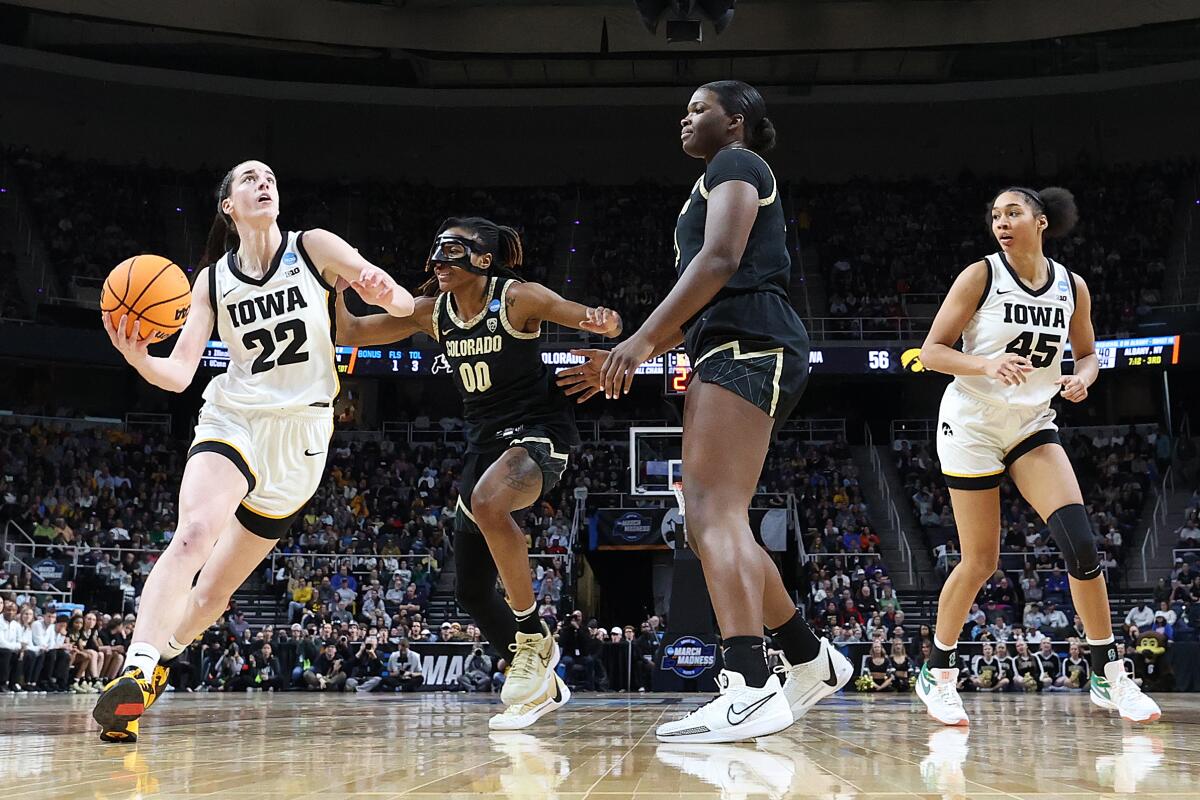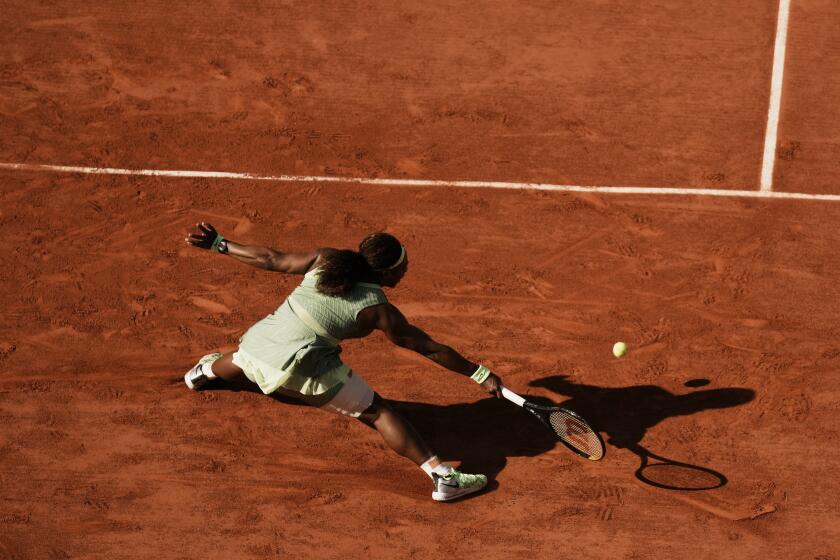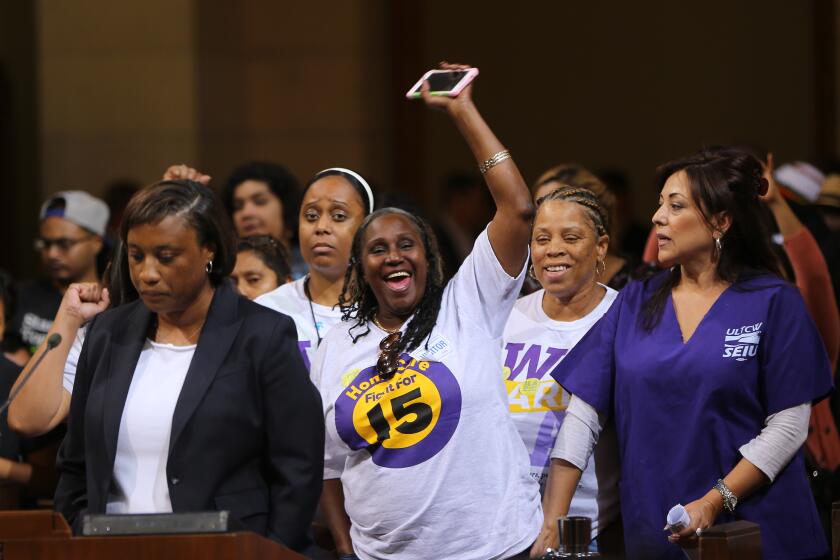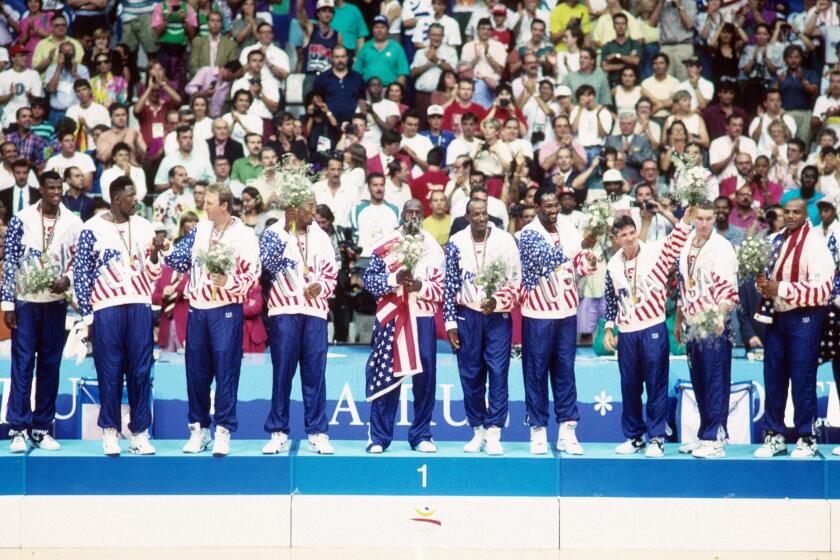Column: Caitlin Clark is having a moment in women’s basketball. She shouldn’t be the only one

- Share via
I’ve been covering women’s sports on and off for more than 20 years — and not just Venus and Serena.
Opinion Columnist
LZ Granderson
LZ Granderson writes about culture, politics, sports and navigating life in America.
When boxer Katie Taylor defended her lightweight titles in front of Conor McGregor at TD Garden in Boston back in 2018, I was there. When a new women’s professional football team, the Atlanta Xplosion, had its first season in 2003, I wrote about it. And in 2007, when the NCAA-history-making basketball star was Oklahoma’s Courtney Paris — and not Iowa’s Caitlin Clark — I wrote this about her: “She’s strong and athletic and confident, and she and others like her make a lot of people feel uncomfortable. Particularly men. Consequently magazines, including the one I write for, will always hesitate to put her on the cover even during the height of basketball season despite the fact she’s the best college basketball player in the country.
“This is March madness.”
Her guile and mental toughness cannot be overstated. She faced abuses and distractions but just got better and better. She slowed with age but kept winning.
I’m glad that 17 years later, as Clark is having her moment, even more people are tuning in. This season she overtook Pete Maravich for the most points scored in an NCAA career and in doing so became a household name. She’s been the talk of the NCAA tournament so far. Winning the championship on Sunday would end her college career with an exclamation point — but regardless, she has plenty of dollar signs in her future. Her accomplishments and style of play have sparked a lot of interest in the sport, and unlike the March Madness stars of the past, she’s able to monetize that interest thanks to new rules.
However, what’s going to happen to all of this momentum in women’s basketball after this once-in-a-generation player is off the court?
We need more change than one athlete can bring. And we’ve waited long enough. In my two decades of covering women’s sports, two things have been consistent: sexism from men and lack of support from women.
Yeah, I said it.
Sexism from men doesn’t explain all the disparities we see today. When I was born, we could entirely fault men for marginalizing women’s sports. At the time, women were financially disempowered. They couldn’t even have a credit card in their name.
Pledging to name a Black woman to the Senate or as a running mate is so much less than they’ve earned.
But times have changed, and the conversation around women’s sports needs an update.
Today, despite disparities in income even in the developed world, women are on the verge of controlling most of the world’s personal wealth.
So while it is true men have historically not supported female athletes or leagues, what exactly has stopped women from pouring money into women’s basketball and other sports?
This conversation is the same today as it was when Brandi Chastain kicked the U.S. into World Cup history in 1999. Kylie Jenner was not quite 2 then. She’s now a billionaire thanks in large part to the spending power of women. Meanwhile the Brandi Chastains of this generation are still in search of equal pay.
It was fun in 1992 with the Michael Jordan ‘Dream Team,’ but now that professional players are so meh about it, I’d rather see college players represent us.
When Paris was a Sooner, she collected double-digit points and rebounds for a record-breaking 112 consecutive games and became the first college player to collect 2,500 points and 2,000 rebounds in their career. She is the first four-time AP All-American in NCAA history. After college, Paris — like many of the best women in the game before and since — spent time playing overseas to supplement her WNBA income.
That economic reality first came into focus in 2015 after a team in Russia paid Diana Taurasi — the WNBA’s all-time leading scorer — not to play for the Phoenix Mercury that season so she could be fresher for them. That dynamic was reintroduced to the public after Russia wrongfully detained Brittney Griner, who had been the NCAA’s all-time leader in blocked shots, for 10 months in 2022. Griner was only there to earn some extra money playing for Ekaterinburg.
Even beyond the world of basketball, the chasm between accomplishments and wealth is great. Measuring her last year on tour, Forbes listed Serena Williams 49th among the 50 highest-paid athletes in 2023. She was the only woman.
Taylor Swift became the first person — man or woman — to have a tour gross more than $1 billion. Beyoncé’s “Renaissance” was the second-highest-grossing tour last year, Pink’s “Carnival” was eighth. I’m a fan of each of these artists. Been to a number of shows. Definitely a lot of women in those stands.
Will fans finally show that kind of love for women’s sports? We could start with women’s basketball, if the spotlight on this year’s superstar can grow brighter and expand to more and more worthy players.
This year it’s cool to follow someone like Clark into the WNBA, giving the league an economic push worthy of the level of play.
But real love for the game is following them all.
More to Read
A cure for the common opinion
Get thought-provoking perspectives with our weekly newsletter.
You may occasionally receive promotional content from the Los Angeles Times.















